Annual cicada species are those that arrive every year (annually). In the U.S.A., each continental state has at least 4 species of cicadas. California as over 80.
Wonder which annual cicadas are in your area? Try our cicada species page. If you’re outside the U.S.A., start your search here.
Some guides for identifying Neotibicen & Megatibicen, a common genus of cicadas in North America:
- The Dusk Singers
- The Scissors Grinders
- Dog Day Cicadas
- Identifying Neotibicen
- The smaller Neotibicen
- Megatibicen
Three other excellent resources include: iNaturalist (enter a cicada name, and find out when people find them), BugGuide (USA), and Insect Singers (for sounds).
Here are a small portion of the species that can be found in the USA:
Diceroprocta apache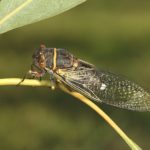 Common Name: Citrus Cicada Locations: AZ, CA, CO, NV, UT When: June-September. Peaks in July. |
Diceroprocta olympusa>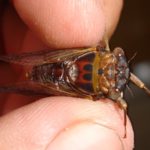 Common Name: Olympic Scrub Cicada Locations: AL, FL, GA, MS, NC, SC When: June-August. Peaks in August. |
Neocicada hieroglyphica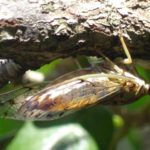 Common Name: Hieroglyphic Cicada Locations: AL, AR, DE, FL, GA, IL, IN, KS, KY, LA, MD, MS, MO, NJ, NY, NC, OH, OK, SC, TN, TX, VA When: May-August. Peaks in June. |
Okanagana bella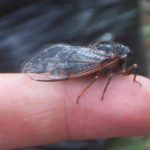 Common Name: Mountain Cicada Locations: AB, AZ, BC, CA, CO, ID, MT, NV, NM, OR, SD, UT, WA, WY When: June-July. Peaks in June. |
Okanagana rimosa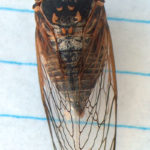 Common Name: Say’s Cicada Locations: AB, BC, CA, CT, ID, IL, IN, IA, ME, MB, MD, MA, MI, MN, MT, NV, NB, NH, NJ, NY, ND, OH, ON, OR, PA, QC, SD, UT, VT, VA, WA, WI, WY When: May-July. Peak in June. |
Neotibicen superbus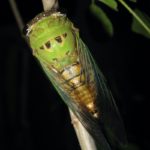 Common Name: Superb Dog-Day Cicada Locations: AR, KS, LA, MO, NM, OK, TX When: June-August. Peak in July. |
Neotibicen dorsatus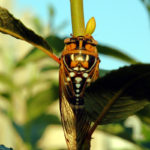 Common Name: Bush Cicada or Grand Western or Giant Grassland Cicada Locations: AR, CO, ID, IL, IA, KS, MO, MT, NE, NM, OK, SD, TX, WY When: July-September. Peaks in August. |
Cicadettana calliope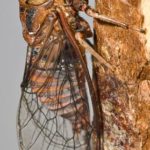 Common Name: Southern Grass Cicada Locations: AL, AR, CO, FL, GA, IL, IN, IA, KS, KY, LA, MD, MS, MO, NE, NC, OH, OK, SC, SD, TN, TX, VA When: May-August, peaking in July. |
Neotibicen pruinosus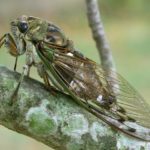 Common Name: Scissor(s) Grinder Locations: AL, AR, CO, IL, IN, IA, KS, KY, LA, MI, MN, MS, MO, NE, NC, OH, OK, PA, SC, SD, TN, TX, WV, WI When: June-October. Peak in August. |
Here’s a list by state:
By State
Alabama, Arizona, Arkansas, California, Colorado, Connecticut, Delaware, Florida, Georgia, Idaho, Illinois, Iowa, Indiana, Kansas, Kentucky, Louisiana, Maine, Maryland, Massachusetts, Michigan, Minnesota, Mississippi, Missouri, Montana, Nebraska, Nevada, New Hampshire, New Jersey, New Mexico, New York, North Carolina, North Dakota, Ohio, Oklahoma, Oregon, Pennsylvania, Rhode Island, South Carolina, South Dakota, Tennessee, Texas, Utah, Vermont, Virginia, Washington, West Virginia, Wisconsin, Wyoming.
40 replies on “Annual Cicada Season in the U.S.A.”
First day of the screeching noise in ohio. Some reason they are mostly in my yard compared to my neighbors. Have had some people stop to look at them on my trees.
It is June 16th and I’m in Iowa City, Iowa. I am wondering what the ground temperature has to be for a annual cicada to come out. Because the ground it already 70.
@Kenji, Grass Cicadas and Say’s Cicada should be out in Iowa, not sure specifically in Iowa City.
Morning and Lyric cicadas should be starting soon as well.
Here’s a list of cicadas in Iowa.
They have been singing here for over 2 weeks…. large numbers just east of Durango Colorado
Anyone know how much longer the noise will last?
Goodyear, Az. Just heard them this evening for the first time this summer.
Calliope and the other USA “Cicadettas” are now in genus Cicadettana since they are not closely related to Cicadetta montana of Europe. And dorsatus and the other larger ones have gone to Megatibicen.
Thanks. I have to update my database as well.
We’re in Kansas City, MO and haven’t heard any Cicadas – anyone know why? This time last year they were already out in full force…
Its now mid July, I still have not heard any. I have found shells but not heard one single noise. Its a quite summer this year. Any reason they are active but not screaming like every other year?
It could be the weather.
cicadas are amazing insects they have very keen eyesight and the annual cicada is a very Swift agile flying insect I don’t believe I’ve ever seen an insect fly faster then a spooked cicada
The 17-year cicada swarm has been out and about in full force in my neighborhood and beyond for a couple of weeks now. I’ve been swatting (purposefully), stepping on and driving over (accidentally), and recording (my real intention) their drone in many places throughout Ohio. Please have a listen, and read my blog post below:
http://www.richardalanhannon.com/cicadamania/
I live in New Haven CT & I have spotted shells of cicadas on and around my back steps and the telltale holes in my yard around our tree . We had loads of them in 2013 bug they stayed in the yard . I don’t know why they have migrated to the cement of my patio ?
So I watched it hatch last night. After the wings folded in for about an hour, it started crawling up the tree. I went inside for a minute and when I came out it was gone!!?? The were no animals around!! I checked to see if it fell. I didn’t see anything. It also couldn’t of crawled up the tree that quickly. What do you think happen to it??
I have no idea but I think it might’ve learned how to fly like that very Young?
I will never forget this night so I went to Homdel park and I saw a nymph climbing up a tree it looked like neotibicen lyricen. I brang it back and watched it hatch in my backyard it is now hanging onto its shell. I have never seen one hatch in my life it was amazing!!
O.O NOPE
I was in Long Island earlier today at a party, and I heard a chorus of now called neotibicen lyricens. One after the other sang around sunset. I was amazing at how many there were.
Any idea why I haven’t heard many Choloromeras yet? All I’ve heard are lyricens so far.
I couldn’t say. lyricens and linnei normally emerge before Neotibicen tibicen tibicen (the current name). Wait a few weeks.
Hello all. Cicadas here in Jacksonville, AL. There are so many around my house that I am too afraid to go out at night. The noise scares me and its too loud. You’re guaranteed to get hit by at least one cicada a night if you are outside our house. They are white and green and very beautiful but a problem. I’m going to try putting a tarp out to tie it to the trees and catch all the nymphs that hatch and either kill them or let them go somewhere in the woods where I’ll never go.
Maybe I should have done just that then.
I went to the park last night and I found two cicadas one in its teneral state and the other a nymph crawling up the tree. I brang them home in a jar. The problem was that I picked up the teneral adult to roughly, and it’s wings got damaged and it had trouble walking. I feel so bad. So I let it go in my neighbors tree. The other nymph I kept because I wanted to see it hatch. Well it was 2:30 and I was really tired. So I let the nymph go on the lawn in the front of the house. I was happy I cought them, but sad that one would probably die, and the other had trouble finding a spot to moult.
I usually just take photos or video.
Heard the first lyricens today!!! Going cicada hunting tonight!!!
Good luck! the linnei are out as well.
I have one more question, When would be the best time to search for nymphs emerging from the ground?
After astronomical sunset. Between 9 and 11pm have been lucky for me. I just check all the trees every 15 minutes or so.
Does temperature affect the cicadas? I mean it’s been up and down lately and here it is July 3rd.last year I heard the first one on July 5th and it was in the 90s and humid a couple of days before. Will they be later this year? Probably right?
Yes. Temperature effects when they’ll emerge from the ground, as well as their behavior above ground. Once they’re above ground, if they get too cool or too hot, they won’t fly or sing. Cloudy weather and rain, in particular, keeps them from singing.
This behavior varies from species to species, but most cicadas are happy once it gets above 80.
Hi my name is Cameron Marietta and I love cicadas I am 14 years old and I live in South Amboy New Jersey. Last year was a great year for me I witnessed one hatching in my backyard and hundreds of shells at the park in Monmouth County. I caught to mating in the same park. I hope to do it all over again this year. So the weather is supposed to be in the 80s most of next week, which is well above average.The average for this time year should be in the mid to upper 60s.I know it is only May, but is it possible that the very first ones might begin to emerge?I mean the trees are just starting to grow their leaves so I don’t know if the cicadas count the cycle, but I was just curious. I think I spoke to you last year too.hope to see you respond soon thank you!!!
Maybe a Neocicada this early in the year, but I don’t think any Tibicen will emerge until July.
If you photograph anything, share it on the Facebook page or twitter. https://www.facebook.com/pages/Cicada-Mania/102174635782?ref=mf
Hello
we see green annual cicada in Iran. blew link show they:
http://upload.wikimedia.org/wikipedia/fa/thumb/5/5f/Hashare-Hemiptera.JPG/220px-Hashare-Hemiptera.JPG
Periodical cicadas can emerge a year after the main brood emerges. This phenomena is called straggling.
They might be Magicicada stragglers. Feel free to post a URL to an image or video so we can have a look.
Sorry to hear about the trees being removed from your neighborhood. Yes, tree removal is likely the top reason why cicadas will disappear in a particular area. You can always travel to a local park. There should be a few big parks in Middlesex and Monmouth county you can visit. I used to live in Middlesex county and now live in Monmouth. I usually hear the Tibicen tibicen, Tibicen lyricen, Tibicen linnei and Tibicen canicularis in that area.
Hi,
I think the cold spring we (Mid Atlantic) has had a massive effect on the annual cicadas. It’s almost July and here in northern VA I have heard…..ONE…!!!… annual cicada in the last week. Defintely somethingt not right, hopefully they’re just delayed.
The cold spring also massively affected the arrival of hummingbirds. I think it has also affected many more insects that we’re not aware of., which is a problem because it’s all part of the food chain.
In the UK for example, insect levels are down 40% because of their very cold spring (caused by slipping jet stream, same problem we had)and it’s severely affecting food availability for bird species that eat insects. Just shows you how climate change can have big effects.
It’s just so weird being almsot July and the garden is absolutely quiet……
Beginning in 2010, I noticed a disturbing(?) trend. By late July or early August, you almost always heard cicadas buzzing away during the day. I lived in northern/central NJ almost my entire adult life. I never, ever went a summer without hearing cicadas. Now there are not any cicadas buzzing away. I mean zero. I previously did not know that cicada wasps existed. I’ve seen some big wasps before, but not a cicada attacking, burrowing wasp. Now I live in North Plainfield NJ. There are now hundreds of wasp burrows, everywhere I turn. So what do I think happened? I lived in Maplewood, and North Plainfield NJ for many years. There may have been a few cicada wasps around, but not a huge amount. The amount of cicadas outnumbered the wasps and many were around during the day, buzzing away. That’s not happening this summer. Possibly, from climate change or other factors unknown to me/us, the cicada wasps expanded their range to this part of NJ. The days are eerily quiet without the cicadas present. If anyone has an explanation for this, please post it.
I was at Lake Logan in southern Ohio on 06 May 2012 and saw an Annual Cicada on my bicycle tire as I was getting ready to leave. It was smaller than the Dog Day variety, and the color was also much lighter. I was an avid bug collector in my early teen years, and I’ve never seen any Cicadas in the spring before. This particular specimen was relocated to a tree my bike was leaning against before I left. I regretted not taking a picture of it, as they are a beautiful bug.
I would like to inform whomever publishes to where the “Locusts” have been spotted, that they have also arrived here in Maryland. I see approximately 6-10 a day, mostly already dead. Also, I’d like to say that I find this site to very informative. Great Job!